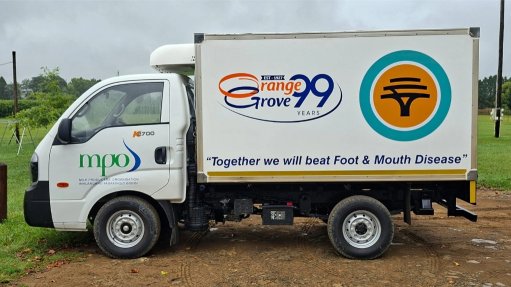South Africa hits out at credit rating ‘bias’ as upgrade awaited
South Africa would welcome an upgrade of its credit score, but Finance Minister Enoch Godongwana — who says ratings-company bias against the continent is real — isn’t holding his breath.
“My sense is that it’s not a foregone conclusion,” Godongwana said in an interview in Cape Town on the eve of an update by S&P Global Ratings on its latest assessment of the country. “It’s going to be a bonus if they give us a better rating.”
Godongwana spoke a day after delivering a budget that stoked investor optimism that the country’s finances have finally turned a corner. S&P, which assesses South Africa’s long-term foreign debt at BB-minus — three notches below investment grade — with a positive outlook, is scheduled to review the rating on Friday.
The minister’s medium-term budget included the formal adoption of a 3% inflation target and better-than-expected revenue collection, while maintaining the forecast that debt as a share of gross domestic product would peak this year and then decline.
The news fuelled a rally in South African assets, driving the rand below 17 to the dollar for the first time since February 2023. Yields on the government’s 10-year benchmark bond declined, touching 8.6%, compared with 8.8% before the announcement on Wednesday.
Several private-sector economists said the budget would tip the balance in South Africa’s favour for an S&P upgrade. Godongwana agreed the current rating doesn’t reflect the nation’s progress in improving its fiscal position. Rival companies Moody’s Ratings and Fitch Ratings rate the country sub-investment grade Ba2 and BB- respectively.
“They are behind the curve,” he said, given the nation’s improved debt trajectory over the past five years. “They might find one minor issue: For instance, our measurement of debt is not the same as theirs.”
Godongwana also shared the frustration of his counterparts in the region that rating agencies are systematically grading African nations more harshly than their peers in other parts of the world, and this translates into weaker credit ratings, along with higher borrowing costs. Ghana and Zambia, which both defaulted on their loans partly due to the Covid-19 pandemic, have been particularly vocal in their criticism of the ratings agencies for downgrades.
“There is already a bias against the African continent by multinational institutions, by the investing community, by rating agencies,” he said. An expert panel report to the Group of 20 summit in Johannesburg next week will have “data to prove that,” the minister said.
“Countries with the same fiscal metrics get a better rating than Africans,” he added. “There’s little default by African countries, by the way. They service their debt — even if people can’t eat food — but they service their debt.”
Godongwana’s budget also included a commitment to finalise a proposal for the adoption of a fiscal anchor next year, designed to maintain the government’s discipline over public finances.
South Africa already aims for a primary budget surplus — where revenue exceeds non-interest spending — but Godongwana said he was wary of binding the government to numerical fiscal targets that limit its policy options.
He proposes a framework containing a range of policies to guide the fiscal path that gave lawmakers oversight and avoided “technocrats overruling politicians.”
That could work well under South Africa’s current coalition government, which faced a severe test earlier this year when opposition to his proposal for a tax increase delayed the 2025 budget for several months. The so-called government of national unity managed to stay together and a fiscal framework could play an important role in keeping the coalition together.
“The good thing about that: it can also make the GNU enduring because there’s not going to be bickering over the next five years over policy, because policy is locked,” he said.
Article Enquiry
Email Article
Save Article
Feedback
To advertise email advertising@creamermedia.co.za or click here
Press Office
Announcements
What's On
Subscribe to improve your user experience...
Option 1 (equivalent of R125 a month):
Receive a weekly copy of Creamer Media's Engineering News & Mining Weekly magazine
(print copy for those in South Africa and e-magazine for those outside of South Africa)
Receive daily email newsletters
Access to full search results
Access archive of magazine back copies
Access to Projects in Progress
Access to ONE Research Report of your choice in PDF format
Option 2 (equivalent of R375 a month):
All benefits from Option 1
PLUS
Access to Creamer Media's Research Channel Africa for ALL Research Reports, in PDF format, on various industrial and mining sectors
including Electricity; Water; Energy Transition; Hydrogen; Roads, Rail and Ports; Coal; Gold; Platinum; Battery Metals; etc.
Already a subscriber?
Forgotten your password?
Receive weekly copy of Creamer Media's Engineering News & Mining Weekly magazine (print copy for those in South Africa and e-magazine for those outside of South Africa)
➕
Recieve daily email newsletters
➕
Access to full search results
➕
Access archive of magazine back copies
➕
Access to Projects in Progress
➕
Access to ONE Research Report of your choice in PDF format
RESEARCH CHANNEL AFRICA
R4500 (equivalent of R375 a month)
SUBSCRIBEAll benefits from Option 1
➕
Access to Creamer Media's Research Channel Africa for ALL Research Reports on various industrial and mining sectors, in PDF format, including on:
Electricity
➕
Water
➕
Energy Transition
➕
Hydrogen
➕
Roads, Rail and Ports
➕
Coal
➕
Gold
➕
Platinum
➕
Battery Metals
➕
etc.
Receive all benefits from Option 1 or Option 2 delivered to numerous people at your company
➕
Multiple User names and Passwords for simultaneous log-ins
➕
Intranet integration access to all in your organisation



















